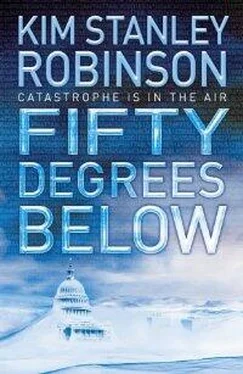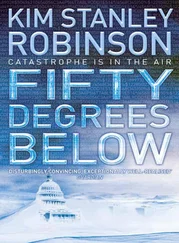Anna was thus a progressive in that limited sense, of evolution not revolution. And for her, science was the medium of progress, progress’s mode of production, if she understood that term; science was both the method of analysis and the design for action.
The action itself—that was politics, and thus a descent back into the Bad Zone of history, with all its struggles and ultimately its wars. But those could be defined as the breakdown of the plan, the replacement of the plan by a violent counterplan. The violence was exerted against the plan; and if ever violence was justified, as being necessary to put a good plan into action, the secondary and tertiary results usually were so bad that the justification could later be proved untrue, the plan itself betrayed by the negative effects of its violent implementation.
Progress had to be made peaceably and collectively. It did not arrive violently. It had to be accomplished by positive actions. Positive ends required positive means, and never otherwise.
Except, was this true? Sometimes her disgust with the selfishness of the administration she was working for grew so intense that she would have been very happy to see the population rise up and storm the White House, tear it down and hand the furniture to the overstuffed fools who had already wrecked the rest of the government. Violent anger if not violent action.
Given these feelings, one obvious opportunity for constructive action had been getting scientists involved in the presidential campaign. Whether or not the SSEEP idea was a good one was very hard for her to judge, but in for a penny in for a pound; and she figured that as an experiment it would give some results, one way or another. Unless it didn’t because of a poor design, any results lost in the noise of everything else going on. The social sciences, she thought, must have a terrible time designing experiments that yielded anything confirmable.
So, ambiguous results, at best; but meanwhile it was still worth trying.
Her actual involvement with the election campaign was at third or fourth remove, which was just the way she liked it, and probably the only way that it remained legal. She could certainly talk to Charlie about things Phil Chase could do as a candidate, if he wanted to, that might help him win. Or even propose actions to him that Phil might initiate; after which they could respond however they wanted, and she could go back to the things she did at NSF directly. Whether they did anything or not was their concern; and so she was not actively working for a candidate.
This was partly the usual scientist’s disconnect from political action, which was itself partly a realism about doing what one could. In any case she preferred spending that kind of time working on her archeology of great lost ideas in federal science policy. She had already gotten Charlie to convince Phil to introduce a bill to the Senate that would revive FCCSET in an even stronger form, under the guise of being part of a larger “Climate Planned Response,” or CPR.
Now she was finding the fossil remnants of various foreign-aid programs that had been focused on science infrastructural proliferation, as she called it. Some of these were inactive because they were funding starved; others had been discontinued. Anna got Diane to assign Laveta and her team to liaise with the UN’s environmental offices, to connect these kinds of projects with funding sources.
“Let’s fund them ourselves when we can’t find anyone else,” Diane suggested. “Let’s get a group together to start rating these projects and awarding grants.”
“And Frank would say that group should start writing requests for proposal.”
Diane nodded. “For sure.”
NSF was now disbursing money at a truly unprecedented rate. The ten-billion-a-year budget goal, only recently achieved, looked like pump-priming compared to what they were now passing out. Though Congress still would not fully fund the repair of the District of Columbia, the right people on the right committees had been scared enough by the flood to start funding whatever efforts seemed most likely to keep their own districts from suffering the same fate. Maybe it was just a matter of politicians wanting to look statesmanlike when the big moment arrived; maybe they were just reflecting what they were hearing from home; maybe the two parties were jockeying for favor in the upcoming election. Whatever the cause, NSF had a supplementary budget this fiscal year of almost twenty billion dollars, and if they could find good ways to spend other federal money, Congress tended to back them.
“They lived through this winter and they’ve seen the light,” Edgardo said.
Anna maintained that the economy could always have afforded to pay for public work like this—that it was not even a particularly large share of the total economy—but that for so many years they had lived within the premises of a war economy that they had forgotten how much humans produced. Now that it was being redirected a little, it was becoming clearer how much the war economy had drained off.
“Interesting,” Edgardo said, looking intently at her. She very seldom talked about politics. “I wonder if it will correlate with the carbon economy. I mean, that we blew the fossil-fuel surplus on wars, and lost the chance to use a onetime surplus to construct a Utopian scientific society. So now we are past the overshoot, and doomed to struggle in extreme danger for some birth-defected smaller version of just-good-enoughness.”
“One step at a time,” Anna insisted. “By the year 2500 it should all look the same.”
She liked the way she could make Edgardo laugh. It was easy, in a way; you only had to say out loud the most horrible thing you could imagine and he would shout with laughter, tears springing to his eyes. And she had to admit there was something bracing about his attitude. He bubbled away like a fountain of acids—everything from vinegar to hydrochloric—and it made you laugh. Once you had said the worst, a certain sting was removed; the secret fear of it, perhaps, the superstition that if you said it aloud you made it more likely to come to pass, as with Charlie and disease. Maybe the reverse was true, and nothing you said out loud could thereafter come true, because of the Pauli exclusion principle or something like it. So now she exchanged dire prophecies with Edgardo freely, to defuse them and to make him laugh.
You needed a theory of black comedy to get through these days anyway, because there was little of any other kind around. Anna worked every minute of her hours at work, until her alarm went off and reminded her it was time to go home. Then she took the Metro home, thankful that it was running again, using that time stubbornly to continue processing jackets, as she used to before the Foundation had gone into crisis mode. Continuing the real work. At home she found that Charlie had been once again sucked into helping Phil Chase’s campaign, an inevitable process now that it was coming down to the wire and they were all doing everything they could; so that he had barely managed to watch Joe while talking on the phone, and had not remembered to go to the store. So off she went, driving so she could stock up on more groceries than could be carried, boggled once again by the destitute look of their grocery store, the best one in the area but sovietized like all the rest of them by the epidemic of hoarding that had plagued her fellow citizens ever since the cold snap, if not the flood. Hoarding was a bad thing; it represented a loss of faith in the system’s ability to supply the necessities reliably. While there might have been some rational basis to it in the beginning, what it now meant is that every time she went to the store huge sections of the shelves were empty, particularly of those products that would be needed in an emergency and could be stored at home: toilet paper, bottled water, flour, rice, canned goods. People were storing these in their houses rather than letting them be stored in the store. She was still waiting for the time when every household maxed, so that when the stores got a shipment the goods would not fly out the doors.
Читать дальше
Конец ознакомительного отрывка
Купить книгу












